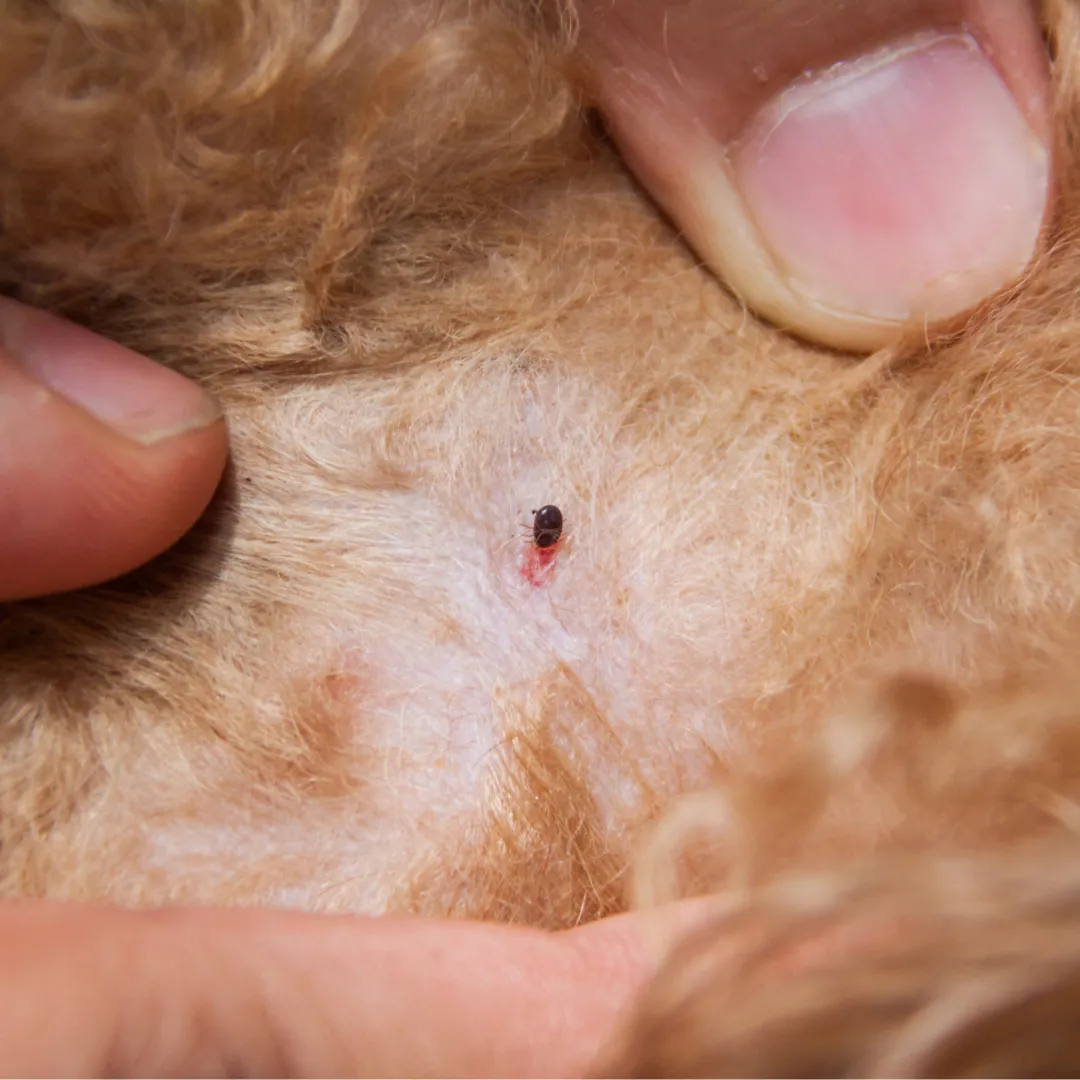Fleas are a relentless nuisance for our canine companions, leading countless dog owners to seek veterinary care. These tiny parasites reproduce rapidly and expertly conceal themselves in every corner of our homes and yards. The moment they encounter a dog, they latch on, feeding on the animal’s blood and causing discomfort. Many conventional flea treatments contain chemicals that can be harsh on your dog or the environment. Fortunately, a variety of effective Home Remedies For Flea Bites On Dogs exist, offering natural alternatives to ensure a flea-free environment for you and your beloved pet.
Discovering that your dog is suffering from flea bites can be distressing, but understanding the signs and knowing how to respond with natural solutions is key to providing prompt relief. These tiny pests not only cause irritation and excessive itching but can also lead to more serious health issues if left untreated. Recognizing the early indicators of a flea infestation allows you to implement timely home remedies, preventing the situation from escalating and restoring your dog’s comfort. For severe itching, it might be beneficial to explore options like best anti itch allergy medicine for dogs to complement natural approaches.
Understanding Flea Bites and Their Effects on Dogs
Fleas don’t just cause a minor itch; their bites can lead to significant discomfort and a range of health problems for your dog. Being able to identify the signs of a flea infestation is the first crucial step in effectively treating your pet and preventing further complications.
How to Identify Fleas on Your Dog
If you notice your dog scratching more frequently than usual, or if there are small red bumps on their skin accompanied by noticeable hair loss, it’s highly probable that your dog has fleas. These parasites are masters of hiding, so a thorough check is necessary. Look closely at your dog’s fur, especially around the base of the tail, groin, and armpits. You might see the fleas themselves, which are small, dark, and fast-moving, or you may spot “flea dirt” – tiny black specks that look like ground pepper. This flea dirt is actually flea feces, composed of digested blood, and if you place it on a wet paper towel, it will turn reddish-brown.
 A dog biting at its fur, indicating the presence of fleas or itchiness
A dog biting at its fur, indicating the presence of fleas or itchiness
Health Risks Associated with Flea Infestations
Beyond the immediate irritation, flea bites can lead to more serious health concerns for dogs. Flea allergy dermatitis (FAD) is the most common allergic reaction in pets, triggered by flea saliva and resulting in intense itching, redness, and skin lesions. In severe infestations, especially in puppies or older dogs, significant blood loss from flea feeding can lead to anemia, a dangerous condition characterized by lethargy, pale gums, and weakness. Moreover, if dogs ingest fleas while grooming, they can contract tapeworms, which are intestinal parasites. In some cases, fleas have also been linked to Bartonellosis, a bacterial infection that can cause symptoms like nausea, fever, irregular heartbeat, and loss of appetite in dogs.
Where Fleas Thrive in the US
Fleas are not evenly distributed across the United States; they tend to flourish in specific environmental conditions. According to PetMD, these resilient pests generally thrive in hot, humid climates, preferring temperatures between 70 – 85°F (21-29°C) and approximately 70% humidity. Conversely, fleas dislike direct exposure to sunlight, a fact that can be strategically used in preventative measures.
In 2012, data from the Banfield Pet Hospital in Birmingham highlighted several states as the most flea-infested, including Alabama, Florida, Georgia, Louisiana, Oregon, South Carolina, Texas, and Washington. These regions often experience year-round flea activity due to their favorable climates. In contrast, states like Arizona and Utah, with their drier environments, tend to have significantly fewer flea issues. Understanding these geographical patterns can help pet owners in affected areas be more vigilant and proactive with flea prevention and treatment.
Effective Home Remedies for Flea Bites on Dogs
The good news for pet owners is that there are numerous ways to combat flea bites and infestations without resorting to harsh chemicals. From soothing baths and topical applications to dietary supplements, a range of home remedies and natural flea treatments can cater to dogs of various temperaments, offering relief from itching and eliminating fleas.
Apple Cider Vinegar: A Natural pH Balancer
Apple cider vinegar (ACV) stands out as a highly effective and natural solution among home remedies for flea bites on dogs. Fleas are averse to acidic environments, and ACV’s acidic nature helps to balance the pH levels of your dog’s skin and fur, creating an unbearable habitat for fleas without negatively impacting your pet.
You can use apple cider vinegar in several ways. One popular method is to create a homemade flea spray for dogs. Mix six cups of apple cider vinegar with four cups of water and a pinch of sea salt. Pour the mixture into a spray bottle, shake it well, and thoroughly spray your dog’s coat, being careful to avoid their eyes. This topical application helps repel fleas directly from the fur. Alternatively, adding a small amount of apple cider vinegar (or any vinegar) to your dog’s drinking water can help eliminate any fleas they might have ingested. Start with a small amount, such as a couple of spoons, to ensure your dog accepts the taste and continues to drink water normally.
Lemon: The Citrus Solution
Similar to apple cider vinegar, lemon is another excellent natural flea remedy for dogs, leveraging its high acidity to combat these pests. This readily available fruit is safe for your dog and detrimental to fleas, all while imparting a refreshing, citrusy scent to your pet’s coat.
One way to utilize lemon is by preparing a lemon bath. Combine half a cup of freshly squeezed lemon juice with two cups of water, then add this mixture to your dog’s regular bathwater. Proceed to wash your canine friend with your usual natural pet soap or shampoo. For a quicker application, you can dip your dog’s comb into lemon juice and brush through their fur. If your dog has very short hair or is hairless, a cloth soaked in lemon juice can be used to wipe down their body, achieving a similar repelling effect. Furthermore, you can boil thin lemon slices, allow the mixture to cool overnight, and then spray it onto soft furnishings around your home to eliminate fleas from the environment, making it a versatile homemade flea spray.
Essential Oils: Potent but Caution Required
Essential oils have gained significant traction for their various benefits in humans, and many are also remarkably effective against fleas on our furry companions. A range of essential oils can serve as potent repellents, with some even possessing properties strong enough to kill fleas.
However, it’s crucial to exercise caution when using essential oils on dogs due to their potency. Direct application or ingestion can be dangerous. Always dilute essential oils with a carrier oil such as coconut oil, avocado oil, or another preferred carrier oil. Alternatively, they can be diluted with water in a glass spray bottle, shaken well before each use. Never add essential oils to your dog’s drinking water.
Effective repellent essential oils include lavender, rose geranium, lemongrass, and rosemary. Add a few drops of any of these to your dog’s natural shampoo or mix them with water and a carrier oil in a glass spray bottle. Apply this mixture to the back of your dog’s neck, taking care to avoid their eyes and ears. It is vital to apply these oils in an area your dog cannot easily lick, as ingesting certain essential oils can lead to stomach upset or, in some cases, toxicity. Remember, essential oils are highly concentrated, so a small amount goes a long way. You can also create a lavender or cedar oil collar by dipping a homemade or store-bought collar into water infused with a few drops of the chosen essential oil, letting it dry, and then placing it on your dog.
 A close-up image of a flea on a dog's fur, showing the parasite clearly
A close-up image of a flea on a dog's fur, showing the parasite clearly
Coconut Oil and Neem Oil: Dual-Purpose Relief
Continuing with the theme of natural oils, coconut oil offers a wonderful solution to repel fleas while also leaving your dog’s coat shiny and luxurious. Unlike many essential oils, coconut oil is safe for ingestion, making it a versatile option. You can rub it all over your dog’s fur for topical flea repellent benefits, or even add a small amount to their pet food, where it acts as an antibacterial treatment when ingested.
Neem oil is another excellent natural alternative. When mixed with water and sprayed onto affected areas, it can significantly reduce itchiness caused by flea bites. While not toxic when ingested, neem oil has a distinct and often unpleasant taste that most dogs dislike, so it’s best used topically. Both coconut oil and neem oil provide effective, natural ways to address flea issues while also promoting overall skin and coat health.
Natural Baths and Dips
For dogs who enjoy a good splash, baths and dips are highly effective home remedies for flea bites on dogs. You can use organic soaps and natural shampoos to cleanse your dog thoroughly. To enhance the flea-repellent action, consider adding a few drops of an approved essential oil (like lavender or rosemary) to the shampoo or bathwater.
A popular and fun alternative is a rosemary dip. To prepare this, steep fresh rosemary leaves in boiling water for several minutes. Strain the liquid to remove the leaves, then dilute the concentrated rosemary water with warm water until it reaches a comfortable, non-scalding temperature for your dog. Allow your dog to soak or splash around in this natural treatment. While effective, ensure your pup doesn’t drink the dip, as ingesting large amounts of herbs can sometimes cause stomach upset. This method not only helps to repel fleas but also leaves your dog smelling fresh.
Environmental Flea Prevention: Securing Your Home and Yard
Treating your dog for fleas is only half the battle. If your dog has fleas, it’s highly likely that your home and yard have also become breeding grounds for these resilient pests. Implementing natural environmental prevention methods is crucial to break the flea life cycle and prevent future infestations.
Homemade Flea Traps
A simple yet effective way to reduce the flea population in your home is by setting up homemade flea traps. All you need is a shallow bowl of warm water and a few drops of dishwashing soap. Place these bowls on the floor overnight, especially in areas your dog frequents. The dish soap reduces the surface tension of the water, making it incredibly sticky for fleas, which are attracted to the warmth and light reflected by the water. In the morning, you’ll likely find several fleas trapped in the mixture. Dispose of the water and wash the bowl thoroughly before reusing.
Diatomaceous Earth: A Natural Desiccant
Diatomaceous earth (DE), a fine white powdery substance extracted from the fossilized remains of ancient algae, is an amazing natural flea and tick treatment for dogs and your home. Its microscopic, sharp edges are harmless to pets and humans but lethal to fleas, as they pierce the insects’ exoskeletons and cause them to dehydrate.
To use DE for flea prevention, sprinkle an even, thin layer on your carpets, rugs, and floors, paying special attention to areas where your dog rests or plays. If possible, block off these areas and leave the diatomaceous earth undisturbed for about 24-48 hours. After this period, thoroughly vacuum up the powder. Diatomaceous earth effectively dehydrates flea eggs, larvae, and adult fleas, thereby preventing another infestation cycle. This is an essential step in any natural flea management strategy for your home.
Steam Cleaning for a Flea-Free Home
Water-based vacuums and steam cleaners are highly effective tools for flea prevention and eradication within your home. These methods work by drowning adult fleas and flushing out dust, dander, and, most importantly, flea eggs and larvae embedded deep within carpets, upholstery, and cracks.
Steam cleaning, in particular, utilizes high temperatures to kill fleas at all life stages, providing a thorough and chemical-free way to sanitize your living spaces. Regular steam cleaning not only eliminates existing fleas and their offspring but also helps to prevent future infestations, leaving your home smelling fresh, looking clean, and significantly reducing the likelihood of a recurrence. It’s a powerful ally in maintaining a flea-free environment.
Clearing Your Yard and Flea-Repellent Plants
Your outdoor space can easily become a prime breeding ground for fleas if not properly maintained. To proactively prevent flea infestations, it’s essential to keep your yard tidy. Regularly clear out any dead plants, fallen leaves, and weeds from your grass and garden beds. This eliminates the dark, damp, and sheltered environments where fleas love to hide and breed.
Additionally, consider incorporating flea-repellent plants into your landscaping. Research which plants thrive in your local climate and strategically place them around your yard, especially near areas your dog frequents. Some examples of plants known for their flea-repelling properties include lavender, spearmint, and lemongrass. These plants release scents that fleas dislike, creating a natural barrier and making your yard less appealing for these pests.
Harnessing the Power of Sunshine
Fleas are notoriously sensitive to light and prefer dark, humid environments. You can leverage this weakness to your advantage in flea prevention. Maximizing the amount of natural sunlight that enters your home can significantly deter fleas. Open curtains and blinds to let the sun stream in, especially in areas where fleas might hide.
Outdoors, clearing out dead plants and keeping your grass trimmed not only removes hiding spots but also allows sunlight to penetrate the ground more effectively. Direct sunlight makes it much harder for fleas to find suitable shelter in your yard, disrupting their life cycle and making the environment less hospitable for them. Integrating sunlight into your prevention strategy is a simple, free, and effective way to make your home and yard less appealing to fleas.
 Efficient natural flea treatments for dogs, illustrating various remedies
Efficient natural flea treatments for dogs, illustrating various remedies
Conclusion
While there are many natural home remedies for flea bites on dogs available, it’s important to remember that they generally take a little longer to show full results compared to conventional chemical treatments due to the absence of harsh ingredients. For most dogs, these natural approaches are highly effective in alleviating symptoms, repelling existing fleas, and preventing future infestations. However, dogs that suffer from severe flea allergies may require stronger, veterinarian-prescribed chemical treatments. The key is consistency and combining both pet-focused and environmental strategies. By diligently applying these natural methods and maintaining a clean environment, you can ensure your dog remains comfortable, healthy, and happily free from flea bites. Explore more articles on natural pet care to keep your furry friend in top condition!
